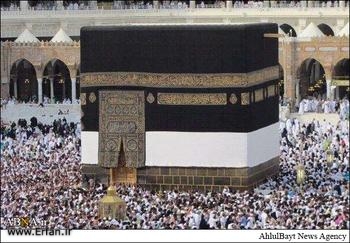
After the martyrdom of Imam 'Ali, his son,Imam Hasan ibn 'Ali, who is recognized by the Shi ah as their second Imam, became caliph. This designation occurred in accordance with Imam 'Ali's last will and testament and also by the allegiance of the community to Imam Hasan. But Mu'awiyah did not remain quiet before this event.
He marched with his army toward Iraq, which was then the capital of the caliphate, and began to wage war against Imam Hasan.
Through different intrigues and the payment of great sums of money, Mu'awiyah was able gradually to corrupt the aides and generals of Hasan. Finally, he was able to force Hasan to hand the caliphate over to him so as to avoid bloodshed and to make peace. 1 Hasan handed the caliphate to Mu'awiyah on the condition that the caliphate would be returned to him after the death of Mu'awiyah and that no harm would come to his partisans. 2
In the year 40/661, Mu'awiyah finally gained control of the caliphate. He then set out immediately for Iraq and in a speech to the people of that land said: "I did not fight against you for the sake of the prayers or of fasting. These acts you can perform yourself. What I wanted to accomplish was to rule over you and this end I have achieved." He also said, "The agreement I made with Hasan is null and void. It lies trampled under my feet." 3 With this declaration, Mu' awiyah made known to the people the real character of his government and revealed the nature of the program he had in mind.
sultanate and a monarchy than a caliphate and vicegerency of the Prophet of Godin its traitional Islamic sense. That is why some who were admitted to his court addressed him as "king." 4He indicated in his declaration that he would separate religion from politics and would not give any guarantees concerning religious duties and regulations. He would spend all his force to preserve and to keep alive his own power, whatever might be the cost. Obviously, a government of such a nature is more of a sultanat and a monarchy than a caliphate and vicegerency of the Prophet of God in its traditional Islamic sense. That is why some who were admitted to his court addressed him as "king". 4
He himself in some private gatherings interpreted his government as a monarchy, 5 while in public he always introduced himself as the caliph.
Naturally, any monarchy that is based on force carries with it inherently the principle of inheritance. Mu'awiyah, too, finally realized this fact, and chose his son, Yazid who was a heedless young man without the least religious personality, 6 as the "crown prince" and his successor. This act was to be the cause of many regrettable events in the future. Mu'awiyah had previously indicated that he would refuse to permit Hasan ibn 'Ali to succeed him as caliph and that he had other thoughts in mind. Therefore, he had caused Hasan to be killed by poisoning, 7 thus preparing the way for his son, Yazid.
In breaking his agreement with Hasan, Mu'awiyah made it clear that he would never permit the Shi' ah of the Household of the Prophet to live in a peaceful and secure environment and continue their activity as before, and he carried into action this very intention. It has been said that he went so far as to declare that whoever would transmit a hadith in praise of the virtues of the Household of the Prophet would have no immunity or protection concerning his life, merchandise and property. 8 At the same time, he ordered that whoever could recite a hadith in praise of the other companions or caliphs would be given sufficient reward. As a result, a noticeable number of hadiths were recorded at this time praising the companions, some of which are of doubtful authenticity. 9 He ordered pejorative comments to be made about 'Ali from the pulpits of mosques throughout the lands of Islam, while he himself sought to revile 'Ali. This command continued to be more or less in effect until the caliphate of 'Umar ibn 'Abd al- 'Aziz, when it was discontinued. 10 With the help of his agents and lieutenants, Mu'awiyah caused the elite and the most outstanding among the partisans of 'Ali to be put to death and the heads of some of them to be carried on lances throughout different cities. 11 The majority of Shiites were forced to disown and even curse 'Ali and to express their disdain for him. If they refused, they were put to death.
____________
1 Ya'qubi, vol, 11, pp. 191, and other books of history.
2 Ya'qubi, vol, 115, pp. 192; Abu 'l-Fida', Vol.I, pp.183.
3 Al-Nisa'ih al-Kifayah of Muhammad al-'Alawi, Baghdad, 1368, vol. II, pp.161 and others.
4 Ya'qubi, vol, 11, pp. 193.
5 Ya'qubi, vol, 115 pp. 207.
6 Yazid was a lecherous and self-indulgent person. He was always drunk and wore silk and unbecoming dress. His nightly parties were combined with music and wine. He had a dog and a monkey which were always with him as companions with which he amused himself. His monkey was named Abu-Qays. He would dress him in beautiful attire and make him be present at his drinking parties. Sometimes, he would mount him on horseback and send him to races. Ya'qubi, vol. 11, pp. 196; Muruj al-Dhahab, vol. III, pp. 77
7 Muruj al-Dhahab, vol. III, pp. 5; Abu '1-Fida', vol. I, pp. 183.
8 Al-Nasa'ih al-Kifayah, pp. 72, recounted from Kitab al-Ahdath.
9 Ya'qubi, vol. II, pp. 199 and 210; Abu 'l-Fida', vlo.l, pp. 186; Muruj al-Dhahab, vol, III, pp. 33 and 35.
10 Al-Nasa'ih al-Kafiyah, pp, 72-73.













